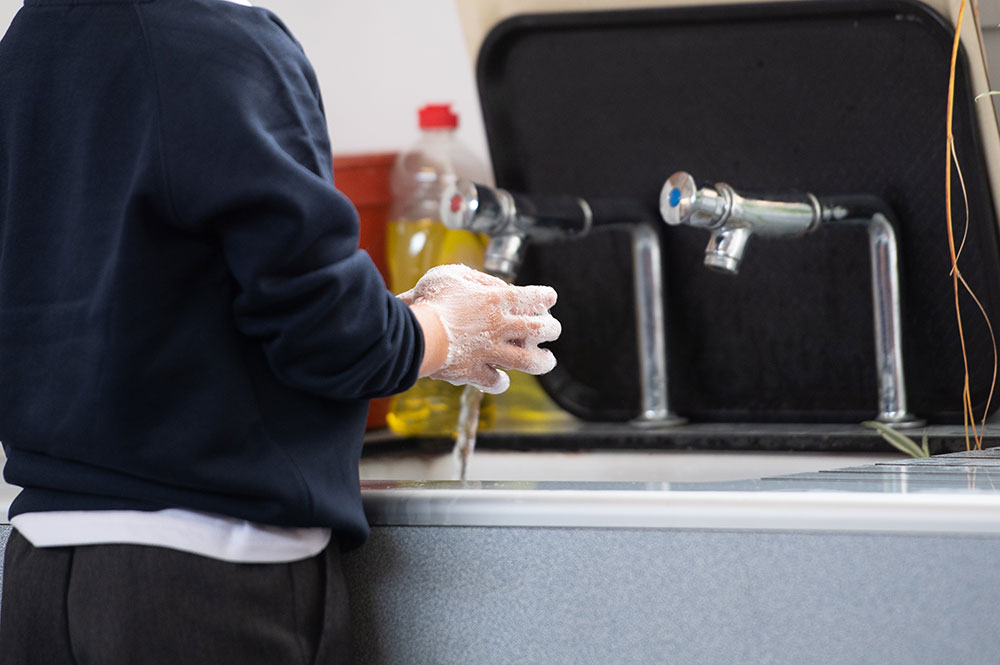Parents will not be allowed to take their children into classrooms on their first day back at school next week.
But City of York Council sought to reassure families that it is safe to send children back to class – as education bosses answered questions from residents about the reopening of schools on Monday.
Sand pits, teddy bears, play doh and settling-in sessions are off the timetable – and classrooms will look “very, very different” with all desks socially distanced and facing forwards.
Hand sanitiser and more handwashing stations will be provided in classrooms.
York’s director of education Amanda Hatton said it is important to get children back to school: “Access to a good education is life-transforming.
“I would say to nervous parents, talk to your schools but know that the best and safest thing for your children is to get them back to school. If you are anxious, please do talk to people about it.”
Questions and answers
What are the symptoms of coronavirus in children?
York’s nurse consultant in public health Anita Dobson said symptoms are similar to those experienced by adults.
She told the meeting: “But children may describe it differently. Children seem to get covid less often and by far it’s usually less serious in children.
“Symptoms are a high temperature and continuous coughing. There may also be a change in sense of smell and taste.”
She said children with symptoms need to stay at home and a test can be arranged by phoning 119 or 111.
If a child develops symptoms while they are at school, they will be taken out of class and a parent or guardian will be asked to collect them.
What happens if a pupil tests positive for coronavirus?
Maxine Squire, from the council’s education team, said public health officers will help identify contacts.
She said: “A decision will be taken as to whether a class or a bubble needs to self-isolate.
“The important thing is the closeness of the contacts between the positive case and those around them.”
Ms Dobson said it is “highly unlikely” that a whole school would close.
What should parents do if their child is anxious and reluctant to go into the school building?
The meeting heard most schools will not want parents to take their children into classes, as they would usually do on the first day at school, to minimise contact between people.
“There are always going to be children who are nervous about going to school and at the moment that’s understandable,” said Tina Hardman , the council’s educational psychologist.
“I think it’s important to see that as a natural reaction.
“A teacher might come out to greet the child and take them into the school rather than them coming in with their parents. I think it’s going to be about the staff reaching out.
What measures have been put in place for transport to school?
Children will be asked to wear face coverings on their school bus and follow social distancing guidelines if possible, the meeting heard.
First has also added extra bus services to and from Joseph Rowntree School and Huntington School.
Ms Squire said: “We have taken the decision for the secondary schools that they won’t be transported in year group bubbles. They are all coming from the same village or area.
“The buses are cleaned between trips.”
How are schools supporting students’ mental health?
Extra e-modules for staff and students’ mental health have been made available to schools, the meeting heard.
A helpline has been launched for parent and carers to speak to educational psychologists, open from 8am to 11.30 every Wednesday on 01904 553055.
What will happen if there is an outbreak at a school?
Ms Hatton said detailed planning has been carried out to deal with any possible outbreak.
If a school were to close temporarily, there are plans to ensure pupils still have access to education including online lessons.
“We have plans to provide access to IT in the really unlikely event that we were to get to the point where certain pupils were not able to attend school,” she said.
What has changed in early years education settings to keep children and staff safe?
“They haven’t been bringing in their teddy bears like they would usually do,” said Barbara Mands, the council’s head of childcare,
She said play doh and sand will not be used in playtime but there are lots of alternative activities available.
“The feedback we have had is that children are really adapting and they are the ones saying ‘we need to wash our hands and keep each other safe,’” she added.
The meeting heard that risk assessments have been carried out at nurseries and pre schools to look at their safety measures.
If a pupil is identified as a contact through test and trace, do parents and family have to isolate?
Under NHS test and trace, anyone who has been in contact with a positive coronavirus case is asked to self-isolate for 14 days and get a test.
But the people they live with do not have to self-isolate, Ms Dobson told the meeting.
She added that if the pupil also tests positive for coronavirus then anyone they live with will need to self-isolate.
